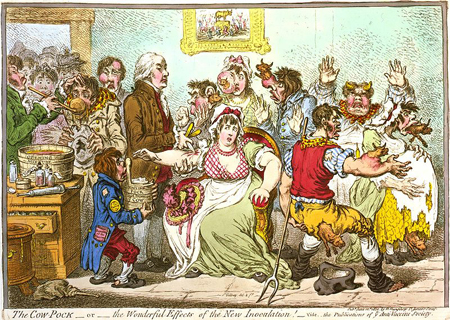Vaccinations over my life

I’m sure I am not the only Baby Boomer to hope that a vaccine against Alzheimer’s disease is developed before my alarming short-term memory loss blossoms into full blown dementia. Meanwhile, I practice spelling WORLD backwards, and counting down from 100 in multiples of seven. Geriatricians use these exercises to assess cognitive ability. Of course I realise that to pass the test through rehearsal would merely be cheating myself. Nor is it the sole determinate. Recently an elderly friend managed to pass the seven’s test (albeit with difficulty) but was caught out when she failed to grasp that Vaucluse is a suburb of Sydney.
Ironically, although the names of acquaintances escape me with embarrassing frequency, my first experience of vaccination remains vivid. Compulsory smallpox vaccination was an eagerly anticipated rite of passage for young Aussies heading overseas in the 1960s and 70s. We cheerfully rolled up our sleeves and wore our disfiguring scars like badges of honour.
My older sister was disappointed when her arm failed to produce the slightest pimple. She was told this was because she had already been exposed to cowpox; legacy of being raised on a dairy farm.
I guess few outside the medical profession would be aware that the word vaccination derives from the Latin vacca, for cow. It is a reminder that a bovine virus led to the discovery of vaccination as a protection against disease.
The connection between smallpox and the relatively harmless cowpox virus was made in the 18th century by Edward Jenner, a country doctor from Gloucestershire. Jenner had noticed that local dairy maids emerged unscathed from smallpox epidemics. In 1796 he extracted fluid from a pustule on the hand of milkmaid Sarah Nelmes and introduced the virus to a 8 year old James Phipps via a simple scratch. The little boy experienced only a mild fever. When his experiment with what became known as ‘vaccination’ proved a success, Jenner established a free clinic for local people. Unfortunately, not everyone supported his work. An anti-vaccination society sprang up, and a satirical cartoon was circulated depicting patients with pustules in the image of cows. ( It is worth noting that Smallpox was declared eradicated by the World Health Organisation in 1979, yet immunisation remains a contentious issue to this day).
Less widely known is that a Dorset dairy farmer by the name of Benjamin Jesty had already experimented with vaccination some 20 years earlier than Doctor Jenner. During an outbreak of smallpox in 1774, Jesty inoculated his wife and two sons with matter drawn from the udder of an infected cow. He was widely criticised for this action at the time, but later his contribution to public health was recognised, and he was awarded a gold medal.
Having recently identified my great-great-grandmother as Martha Guppy, a dairymaid from Dorset, I am beginning to think that my sister’s visits to the cowshed had little to do with her failed vaccination. Although inoculation worked in my own case, I suspect we may have inherited a resistance to smallpox from Martha, along with rather solid ankles.
I have just read an article about the latest research into a vaccine against Alzheimer’s, which I intend sending to my sister. Faced with the prospect of marrying a local farmer and becoming a fifth generation dairymaid, she left home at 17 to train as a nurse. She was later employed as a recreational therapist in a dementia unit. As a fellow Baby Boomer, she is no doubt watching developments in the field with both professional and personal interest!
D-L-R-O-W 100, 93, 86, 79…..
Tell us below, would you like to see a vaccination for dementia? What vaccinations do you remember getting as child?









 Proudly Australian owned and operated
Proudly Australian owned and operated